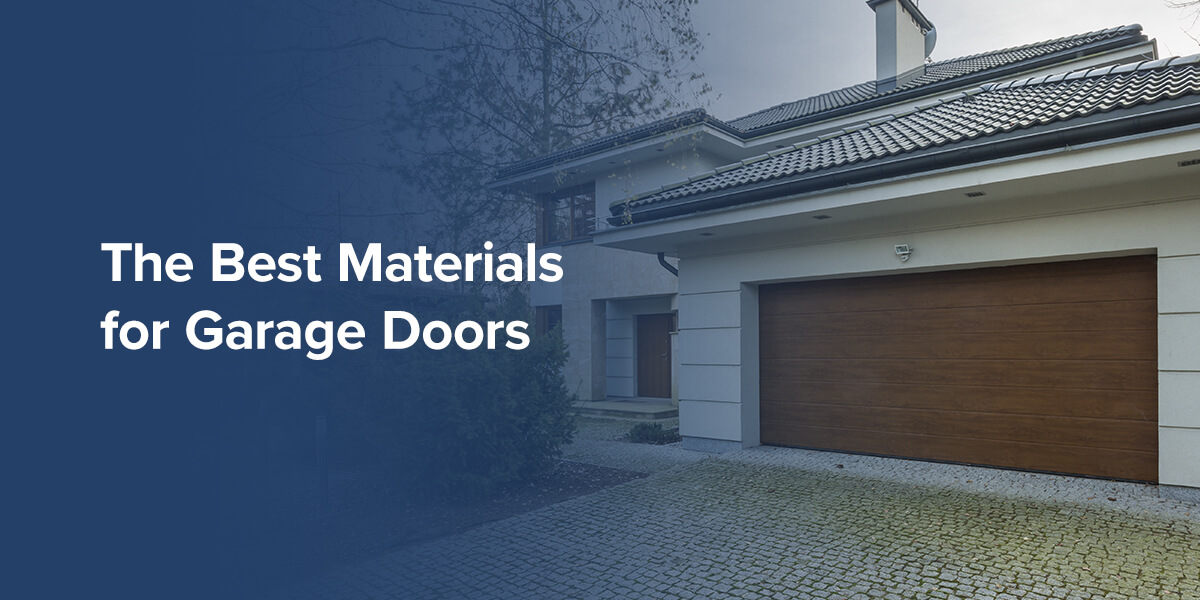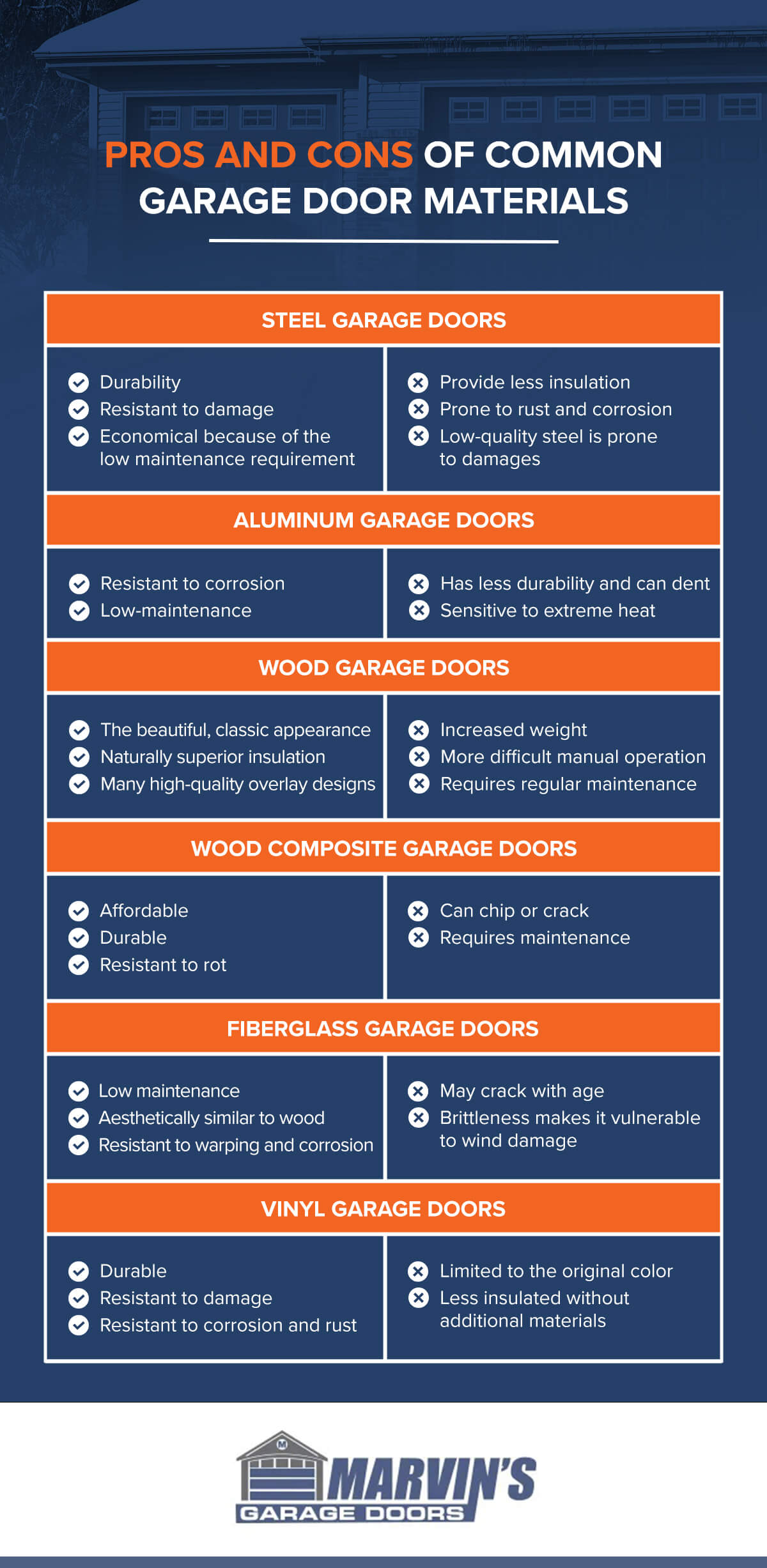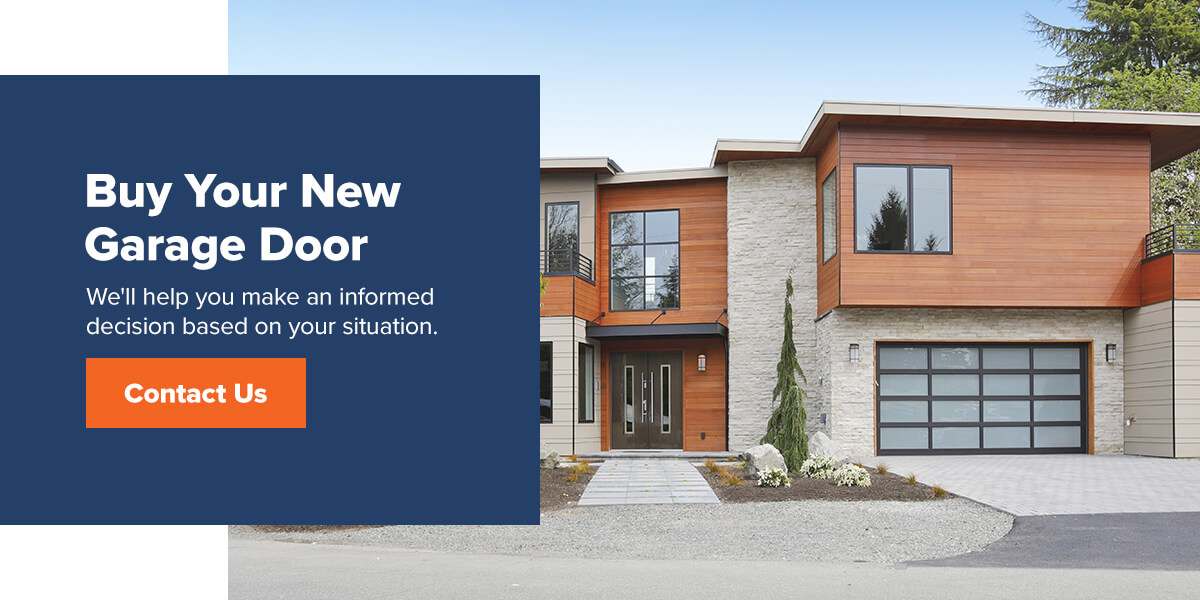

Whenever you’re selecting a new appliance, it’s easy to get lost in the abundance of options and customizations. Garage doors provide safety and security, are often used as a primary entrance and offer a striking sense of curb appeal. You know you need one, but what is the best garage door material for your installation?
This guide explores common garage door materials, and what are garage doors made of, weighing their properties with the pros and cons. Decide on the best garage door for your home.

Steel doors have several appealing features that make them popular. They are durable and of high quality while still being affordable. Steel doors come in many design options and can be more cost-effective than you might expect.
Despite its toughness, steel is lighter in weight than some of the other materials on this list. High-grade steel can tolerate stress and heavy use well. Steel is a reliable material overall for building garage doors.
One drawback to using steel is that this material can be susceptible to rust without a special coating. Steel garage doors may start to rust along the bottom over time. If you live in an area with heavy snowfall, the salt applied to the roads can accelerate the presence of rust. Washing your door at least twice annually can remove dirt and help prevent rust.
Adding insulation to your steel garage door can boost its R-value. An R-value rates a material’s resistance to heat transfer — the higher the number, the greater a material’s total thermal resistance. Since metal is not a good insulator, steel doors benefit from some added insulation to increase their energy efficiency.
The pros of steel garage doors include:
The cons of steel garage doors include:
Aluminum doors are generally more contemporary and have several attractive design options. With many options for window placement, coatings and colors, aluminum garage doors are easy to customize because of how malleable this building material is.
Aluminum is naturally lightweight but can be damaged by strong winds, flying objects or hail. A dent in an aluminum door can be difficult to repair, which may make installing a new door a more appealing option if a door experiences significant damage.
You can add insulation to the aluminum rails to increase the R-value of the door and boost your garage’s thermal protection.
The pros of aluminum garage doors are:
The cons of aluminum garage doors are:
Garage doors made of wood are timeless. As an eco-friendly material and a renewable resource, wood is a simple option with several possibilities, and it works for any style of home. You can customize a wood door’s style, windows and paint colors so it matches your home exterior and serves as a valuable selling feature. Regarding a garage door material comparison, wood doors naturally have superior insulation.
The primary drawback of wood garage doors is that they have a higher upfront cost and higher maintenance. If you take good care of a wood garage door, its beauty will last for decades, but it is vulnerable to chipping, rotting or warping. Wood doors are best for mild climates because of the effects that extreme changes in temperature and excess moisture could have on this material.
The pros of wood garage doors include:
The cons of wood garage doors include:
Composite garage doors are a type of faux wood with a frame containing fiberboard. They are created from recycled materials, including plastic fiber and reclaimed wood. Higher quality composite doors generally have fiberboard of a higher density, and the design features can also appear more realistic for simulating a genuine wood door.
The core of a composite door can be filled with insulation to enhance this material’s temperature control capabilities.
The pros of composite garage doors are:
The cons of composite garage doors are:
Fiberglass is another type of faux wood with a grain texture designed to mimic the appearance and feel of genuine wood. This economical material is resistant to shrinking and warping. It’s a good choice if you live in a humid region with heavy rainfall.
Fiberglass doors can be designed as raised panels or overlays, depending on your aesthetic preferences. Although this material is an excellent fit for homes in warm climates, it is less suited for areas with high winds or along the coasts. Strong winds striking a fiberglass door create a distinctive noise and may also cause damage.
The pros of fiberglass garage doors include:
The cons of fiberglass garage doors include:
Vinyl is a tough synthetic material that makes a strong garage door. Vinyl doors can be manufactured on steel frames for an even higher degree of toughness and filled with insulation to enhance their energy efficiency. It is difficult to damage vinyl, and vinyl doors require minimal maintenance.
Vinyl is a good universal material, but it has its drawbacks. Repainting your vinyl garage door is difficult or even impossible because of how the vinyl is produced, so you should carefully decide the door’s color. In terms of color options, vinyl is limited. The finished product is unalterable.
The pros of vinyl garage doors are:
The cons of vinyl garage doors are:

Now that you know the typical pros and cons of garage door materials, you’re ready to choose a new door to make your home stand out. Based in North Carolina, Marvin’s Garage Doors sells quality products in the Winston-Salem, Wilkesboro, East Bend, Lake Norman and surrounding areas. We carry garage doors made of the most popular materials.
We’ll help you make an informed decision based on your situation. Please feel free to use our garage door visualizer tool to help you choose your preferred style. Contact us if you have any questions about our products or the materials we use.